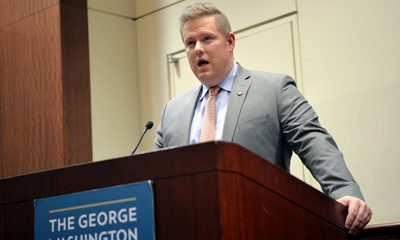National
Preibus elected as new RNC chair
New GOP head opposes same-sex marriage
The Republican National Committee took a new direction on Friday when it elected the chair of the Wisconsin Republican Party — who has stated opposition to same-sex marriage — as its new head.
Reince Priebus claimed the position after seven rounds voting by winning 97 votes among the delegates voting at the conference. To win this chairmanship, Preibus needed to obtain 85 votes.
In the final round of voting, Maria Cino, who served most recently as deputy chair of the RNC, received 43 votes, while Saul Anuzis, former chair of the Michigan Republican Party, received 28 votes.
Michael Steele, the immediate former chair of the RNC, dropped out after the fouth round of voting as he was struggling to find votes necessary to maintain his position. The gaffe-prone Steele had served for two years as RNC chair before deciding to withdraw.
Upon taking the podium for his acceptance speech, Priebus thanked both God and Jesus for his victory. He called for unification of the Republican Party so members of the GOP could mount a more concerted effort to oust President Obama from the White House in 2012.
“We all recognize that there’s a steep hill here ahead of us, and the only way we’ll be able to move forward is if we’re all together,” Priebus said. “We must never forget why we all do this. Because as [President] Reagan said, ‘Our nation is that shining city upon a hill.’ We must work to keep it that way.”
Priebus said he wants to begin his leadership by putting a in place “solid business plan” to “operate effectively and efficiency to begin to restore the faith of our donors.”
“We must know how to spend these funds effectively to aid in our redistricting efforts, to support our 2011 candidates, to hold a world-class convention and to be sure that our Republican presidential nominee has the organization in place to beat Barack Obama,” he said.
The new chair also said he wants to develop a new line of communication with state parties and Republican leaders like House Speaker John Boehner (R-Ohio) and Senate Minority Leader Mitch McConnell (R-Ky.).
Where Priebus will lead the Republican Party on LGBT issues remains to be seen, alth0ugh he’s known for having a history of opposition to same-sex marriage.
Gay bloggers have expressed concern about how Priebus pledged to block marriage rights for same-sex couples in a video posted online prior to his election in response to a question National Organization for Marriage chair Maggie Gallagher.
“There are certain legal definitions that are not just legal and not just protected by our Constitution, but they’re also protected by the sanctity of marriage given to us by God,” Priebus said.
Priebus said he doesn’t believe judges should advance same-sex marriage in their states through court rulings and emphasized the importance of the Defense of Marriage Act, which prohibits federal recognition of same-sex marriage.
The new RNC chair also recalled how he took part in the 2006 effort in Wisconsin to institute a state constitutional ban on gay nuptials.
“I was a part of that,” he said. “I was helpful to make sure that that happened. I was helpful to our attorney general to make sure that that’s happened.
Gay Republicans and GOP organizations have expressed optimism about the election of the new RNC chair and the direction he would take the party.
In a statement, R. Clarke Cooper, executive director of Log Cabin Republicans, praised Preibus calling for unification of the Republican Party over “common interests.”
“Inclusion wins and our party is strongest when we embrace a big tent philosophy centered on the core principles that unite us as Republicans,” Cooper said. “It is onward and upward to win back the White House.”
Via e-mail to the Washington Blade, Cooper commended Preibus for focusing on new management of the RNC during his acceptance speech.
“Chairman Priebus’s first comments focused solely on the operations and management of the RNC as well as raising money for the 2012 cycle,” Cooper said. “He emphasized for all the party elements to work as a team. Prior to the election, Preibus called for additional grassroots and coalition efforts.”
Chris Barron, chair of GOProud, said the election of Preibus marks the end of “Michael Steele’s disastrous tenure at the RNC.”
“The election of Reince Priebus marks a changing of the guard,” Barron said. “Finally we will have an RNC Chair who understands that his or her role is to raise money and build party infrastructure, not to sell books, hire friends and family, and pontificate on policy.”
In July, GOProud was among the GOP organizations calling for Steele’s ouster after then-RNC chair made remarks suggesting that the war in Afghanistan was unwinnable.
Torrey Shearer, a gay D.C. Republican activist, said Preibus’ election is exciting because he would be bring new energy to the Republican Party to capitalize on recent victories at the ballot box.
“This is an opportunity to build on our success from the mid term elections and strengthen the GOP for success in 2012,” Shearer said. “The election of Reince provides a fresh face to a growing movement of Americans wanting a change from the status quo.”
Asked where he thinks Priebus will lead the Republican Party on LGBT issues, Shearer said such movement would “come from the party’s membership, not from its leadership.”
“The recent critical support of GOP members of the House and Senate illustrates the growing acceptance of our issues in the GOP mainstream,” Shearer said
National
Same-sex couples vulnerable to adverse effects of climate change
Williams Institute report based on Census, federal agencies

A new report by the Williams Institute at the UCLA School of Law finds that same-sex couples are at greater risk of experiencing the adverse effects of climate change compared to different-sex couples.
LGBTQ people in same-sex couple households disproportionately live in coastal areas and cities and areas with poorer infrastructure and less access to resources, making them more vulnerable to climate hazards.
Using U.S. Census data and climate risk assessment data from NASA and the Federal Emergency Management Agency, researchers conducted a geographic analysis to assess the climate risk impacting same-sex couples. NASA’s risk assessment focuses on changes to meteorological patterns, infrastructure and built environment, and the presence of at-risk populations. FEMA’s assessment focuses on changes in the occurrence of severe weather events, accounting for at-risk populations, the availability of services, and access to resources.
Results show counties with a higher proportion of same-sex couples are, on average, at increased risk from environmental, infrastructure, and social vulnerabilities due to climate change.
“Given the disparate impact of climate change on LGBTQ populations, climate change policies, including disaster preparedness, response, and recovery plans, must address the specific needs and vulnerabilities facing LGBTQ people,” said study co-author Ari Shaw, senior fellow and director of international programs at the Williams Institute. “Policies should focus on mitigating discriminatory housing and urban development practices, making shelters safe spaces for LGBT people, and ensuring that relief aid reaches displaced LGBTQ individuals and families.”
“Factors underlying the geographic vulnerability are crucial to understanding why same-sex couples are threatened by climate change and whether the findings in our study apply to the broader LGBTQ population,” said study co-author Lindsay Mahowald, research data analyst at the Williams Institute. “More research is needed to examine how disparities in housing, employment, and health care among LGBT people compound the geographic vulnerabilities to climate change.”
Read the report
Federal Government
Lambda Legal praises Biden-Harris administration’s finalized Title IX regulations
New rules to take effect Aug. 1

The Biden-Harris administration’s revised Title IX policy “protects LGBTQ+ students from discrimination and other abuse,” Lambda Legal said in a statement praising the U.S. Department of Education’s issuance of the final rule on Friday.
Slated to take effect on Aug. 1, the new regulations constitute an expansion of the 1972 Title IX civil rights law, which prohibits sex-based discrimination in education programs that receive federal funding.
Pursuant to the U.S. Supreme Court’s ruling in the landmark 2020 Bostock v. Clayton County case, the department’s revised policy clarifies that discrimination on the basis of sexual orientation and gender identity constitutes sex-based discrimination as defined under the law.
“These regulations make it crystal clear that everyone can access schools that are safe, welcoming and that respect their rights,” Education Secretary Miguel Cardona said during a call with reporters on Thursday.
While the new rule does not provide guidance on whether schools must allow transgender students to play on sports teams corresponding with their gender identity to comply with Title IX, the question is addressed in a separate rule proposed by the agency in April.
The administration’s new policy also reverses some Trump-era Title IX rules governing how schools must respond to reports of sexual harassment and sexual assault, which were widely seen as imbalanced in favor of the accused.
Jennifer Klein, the director of the White House Gender Policy Council, said during Thursday’s call that the department sought to strike a balance with respect to these issues, “reaffirming our longstanding commitment to fundamental fairness.”
“We applaud the Biden administration’s action to rescind the legally unsound, cruel, and dangerous sexual harassment and assault rule of the previous administration,” Lambda Legal Nonbinary and Transgender Rights Project Director Sasha Buchert said in the group’s statement on Friday.
“Today’s rule instead appropriately underscores that Title IX’s civil rights protections clearly cover LGBTQ+ students, as well as survivors and pregnant and parenting students across race and gender identity,” she said. “Schools must be places where students can learn and thrive free of harassment, discrimination, and other abuse.”
Michigan
Mich. Democrats spar over LGBTQ-inclusive hate crimes law
Lawmakers disagree on just what kind of statute to pass

Michigan could soon become the latest state to pass an LGBTQ-inclusive hate crime law, but the state’s Democratic lawmakers disagree on just what kind of law they should pass.
Currently, Michigan’s Ethnic Intimidation Act only offers limited protections to victims of crime motivated by their “race, color, religion, gender, or national origin.” Bills proposed by Democratic lawmakers expand the list to include “actual or perceived race, color, religion, gender, sexual orientation, gender identity or expression, ethnicity, physical or mental disability, age, national origin, or association or affiliation with any such individuals.”
Democratic Gov. Gretchen Whitmer and Attorney General Dana Nessel have both advocated for a hate crime law, but house and senate Democrats have each passed different hate crimes packages, and Nessel has blasted both as being too weak.
Under the house proposal that passed last year (House Bill 4474), a first offense would be punishable with a $2,000 fine, up to two years in prison, or both. Penalties double for a second offense, and if a gun or other dangerous weapons is involved, the maximum penalty is six years in prison and a fine of $7,500.
But that proposal stalled when it reached the senate, after far-right news outlets and Fox News reported misinformation that the bill only protected LGBTQ people and would make misgendering a trans person a crime. State Rep. Noah Arbit, the bill’s sponsor, was also made the subject of a recall effort, which ultimately failed.
Arbit submitted a new version of the bill (House Bill 5288) that added sections clarifying that misgendering a person, “intentionally or unintentionally” is not a hate crime, although the latest version (House Bill 5400) of the bill omits this language.
That bill has since stalled in a house committee, in part because the Democrats lost their house majority last November, when two Democratic representatives resigned after being elected mayors. The Democrats regained their house majority last night by winning two special elections.
Meanwhile, the senate passed a different package of hate crime bills sponsored by state Sen. Sylvia Santana (Senate Bill 600) in March that includes much lighter sentences, as well as a clause ensuring that misgendering a person is not a hate crime.
Under the senate bill, if the first offense is only a threat, it would be a misdemeanor punishable by one year in prison and up to $1,000 fine. A subsequent offense or first violent hate crime, including stalking, would be a felony that attracts double the punishment.
Multiple calls and emails from the Washington Blade to both Arbit and Santana requesting comment on the bills for this story went unanswered.
The attorney general’s office sent a statement to the Blade supporting stronger hate crime legislation.
“As a career prosecutor, [Nessel] has seen firsthand how the state’s weak Ethnic Intimidation Act (not updated since the late 1980’s) does not allow for meaningful law enforcement and court intervention before threats become violent and deadly, nor does it consider significant bases for bias. It is our hope that the legislature will pass robust, much-needed updates to this statute,” the statement says.
But Nessel, who has herself been the victim of racially motivated threats, has also blasted all of the bills presented by Democrats as not going far enough.
“Two years is nothing … Why not just give them a parking ticket?” Nessel told Bridge Michigan.
Nessel blames a bizarre alliance far-right and far-left forces that have doomed tougher laws.
“You have this confluence of forces on the far right … this insistence that the First Amendment protects this language, or that the Second Amendment protects the ability to possess firearms under almost any and all circumstances,” Nessel said. “But then you also have the far left that argues basically no one should go to jail or prison for any offense ever.”
The legislature did manage to pass an “institutional desecration” law last year that penalizes hate-motivated vandalism to churches, schools, museums, and community centers, and is LGBTQ-inclusive.
According to data from the U.S. Department of Justice, reported hate crime incidents have been skyrocketing, with attacks motivated by sexual orientation surging by 70 percent from 2020 to 2022, the last year for which data is available.
Twenty-two states, D.C., Puerto Rico, and the U.S. Virgin Islands have passed LGBTQ-inclusive hate crime laws. Another 11 states have hate crime laws that include protections for “sexual orientation” but not “gender identity.”
Michigan Democrats have advanced several key LGBTQ rights priorities since they took unified control of the legislature in 2023. A long-stalled comprehensive anti-discrimination law was passed last year, as did a conversion therapy ban. Last month the legislature updated family law to make surrogacy easier for all couples, including same-sex couples.
A bill to ban the “gay panic” defense has passed the state house and was due for a Senate committee hearing on Wednesday.
-

 District of Columbia4 days ago
District of Columbia4 days agoNew D.C. LGBTQ+ bar Crush set to open April 19
-

 District of Columbia5 days ago
District of Columbia5 days agoReenactment of first gay rights picket at White House draws interest of tourists
-

 Arizona5 days ago
Arizona5 days agoAriz. governor vetoes anti-transgender, Ten Commandments bill
-

 South America3 days ago
South America3 days agoDaniel Zamudio murderer’s parole request denied












